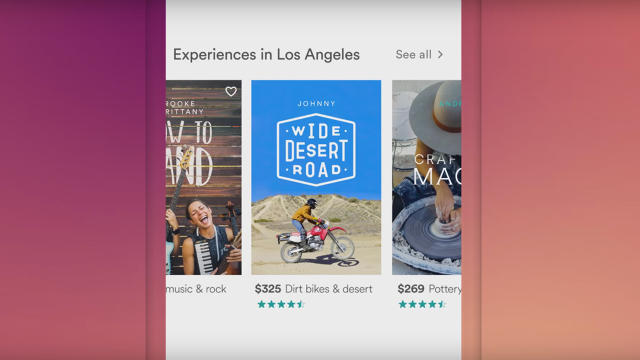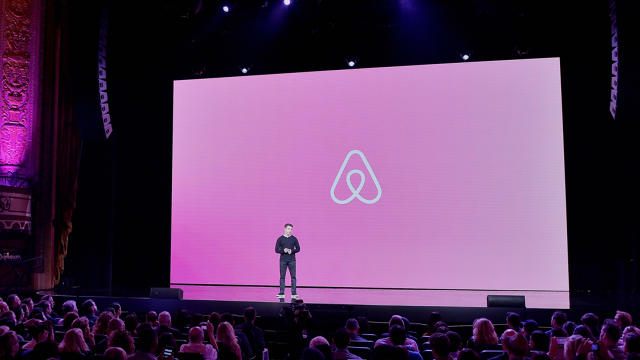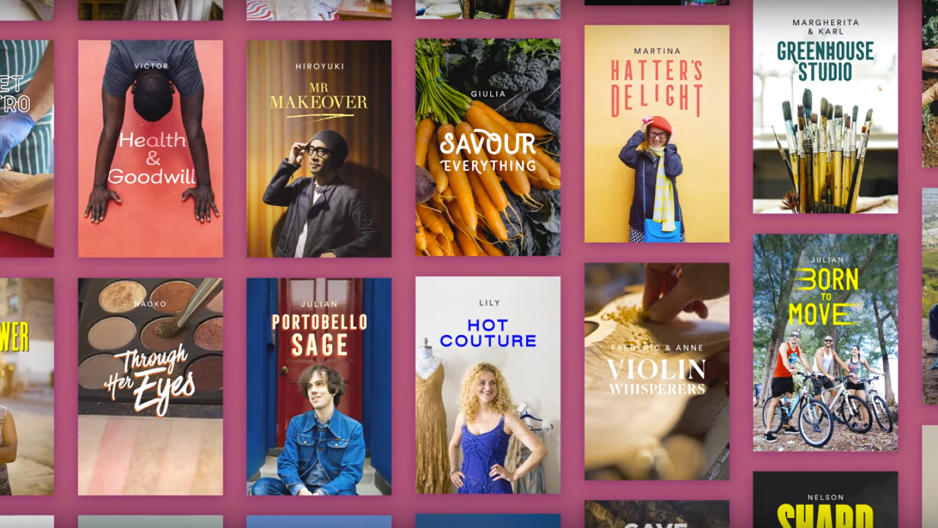Airbnb’s Next Act: Tours, Classes, And Restaurant Reservations
Every year, Airbnb hosts Airbnb Open, a multi-day “festival of hosting” that’s equal parts corporate pep rally, trade show, and gesture of public goodwill. This year’s event is in Los Angeles, a city where they recently agreed—after much controversy—to collect taxes from hosts. Onstage at the conference, CEO Brian Chesky announced the company’s new plan: Branching into tours and organized events in cities across the world, in what Airbnb refers to as the “biggest news in company history” and its “next chapter.”
From Homes To Experiences

Onstage, in a flashy presentation that name-dropped American mythologist Joseph Campbell, CEO Brian Chesky showed off the company’s new Experiences product.
Experiences, which is bundled into a larger rollout called Airbnb Trips, offers paid tours and outings for users. Visitors (or locals) sign up for single-day or multi-day experiences such as food tours, classes, or guided hikes. Airbnb vets the experiences which make it to the platform, and takes a commission from each ticket that a host sells through their service. The product will initially be available in 12 cities including San Francisco, Los Angeles, Detroit, Tokyo, and Paris; 39 more cities are planned for rollout in 2017 worldwide.
Prices for the experiences start in the $30 range in most markets and go into the multi-hundred dollar range for multiple-day events.
Airbnb Trips will also eventually include the ability for guests to rent cars, order groceries, and even make hotel reservations through Airbnb’s app. However, no timeframe for these new functionalities was announced onstage by Chesky.
“Until now, Airbnb has been about homes,” Chesky added. “Today, Airbnb is launching Trips, bringing together where you stay, what you do, and the people you meet all in one place. We want to make travel magical again by putting people back at the heart of every trip.”
It also offers something that’s magical from a financial perspective, given that investors are waiting for Airbnb to announce an IPO: New potential revenue streams after the company dominated the homeshare industry.
Entering A New Market
While Airbnb brands its classes and tours as “Experiences,” they fall into a long-existing class of product: local tours and special events. And there are plenty of competitors, from aggregators such as Groupon and Eventbrite to search engines like Viator.
In Los Angeles, some of the events Airbnb offers include surfing and camping trips, escape bus adventures, in-home concerts, and immersion in the world of reality television. A good number of the experiences are also categorized as “Social Impact Work” by the company and include activities such as working with the homeless, volunteering at animal shelters, and drop-in work with a wide range of community organizations.
At the moment, the main way to access Experiences is through Airbnb’s mobile app, which offers access to the majority of the offerings currently available to Airbnb users. By comparison, a limited number of outings are accessible through Airbnb’s website. Alex Schleifer, Airbnb’s vice president of design, said that “Airbnb started in the Web 2.0 era, but in the last two to three years, we shifted into becoming mobile first. That’s why we started shifting towards things such as video in portrait mode;” the new Experiences feature includes lots of mobile-friendly photos and video on the app.
There’s Money In Tours
Experiences also has one big benefit for Airbnb, which defeated rivals like HomeEscape, Vrbo, and Couchsurfing to become the homesharing/short-term rental industry leader: It offers access to an entirely new market of customers who might live locally and hosts who look for ways to upsell their Airbnb trips with special features for their guests.
I spoke with Airbnb cofounder and chief product officer Joe Gebbia about an earlier incarnation of Experiences called Experience Marketplace which was tested internally over the past few years.

Gebbia tells me that “An exciting aspect of the business side of it is something we learned from the Experience Marketplace pilot. We had a host in San Francisco who couldn’t rent out her home because she lived with her mother. She didn’t have any extra space in her home, but through Experience Marketplace, she was actually able to participate with Airbnb. She gives these urban tours of San Francisco which take visitors to places like Twin Peaks or the Presidio. She’s able to earn significant amounts of income for herself, even when she doesn’t have a home listed on there.”
Another Experience host in Paris, Gebbia adds, made approximately $15,000 offering experiences over a six-month timespan versus approximately $3000 renting their apartment out on Airbnb.
Along with Uber, Airbnb tops the lists of many investors’ most eagerly awaited IPOs. Although the company hasn’t made any plans public, an IPO announcement in 2017 would not be unexpected.
Regulatory Issues
The rollout of Experiences gives Airbnb a secondary line of revenue—and could assure investors that the company can develop backup products even while facing stiff regulatory challenges in cities like New York, San Francisco and Chicago. Outside the Airbnb Open event in Los Angeles, billboard trucks from anti-Airbnb lobbying group Share Better (which has ties to the hotel industry) were a regular presence.
But every new product launch faces its own challenges, especially for a service like Airbnb that enters into heavily regulated spaces. In New York and a number of other cities, tour guides require licenses—something that could potentially put Experiences hosts at legal risk.
Gebbia says “We encourage all of our hosts to follow all laws and regulations, and it’s a pretty rigorous vetting process (for the hosts). Anyone can apply, but it’s an application-based process. There’s a lot of checkpoints on the way.”
He adds that the criteria for Experiences hosts is stricter than that for people offering their home. When I asked about the question of legal liability—Experiences includes outings like helicopter rides, CrossFit-style workouts, and cooking classes that have the risk of injury—Airbnb pointed to a liability program similar to that offered for home rentals.
The Long March Toward An IPO
Experiences is a significant sign of where Chesky, Gebbia, and company are headed in the future. At a certain point in Airbnb’s future, they’re simply going to saturate the market: There are only so many hip Williamsburg lofts or Tuscan villas that the vacation marketplace can bear, and the company is not yet a giant of business travel. Despite many corporate customers using Airbnb (or letting their employees choose Airbnb), the company’s business travel footprint is small compared to a Hilton or a Starwood. Experiences is a giant signal to investors that Airbnb has plenty of room to scale.

However, what fascinated me was something altogether different. When I sat down in a downtown Los Angeles movie theatre to see Chesky’s speech on Thursday, the audience was primarily Airbnb employees and fellow journalists. But as the day went on, I ran into large numbers of Airbnb hosts who had traveled to the conference. Local restaurateurs and bar owners told me of an upswing in their business; Airbnb’s footing the bill for an outdoor Maroon 5 show that’s open to the public over the weekend in a city park.
In the battle to win the hearts and minds of the public, regulators, investors, and customers, Airbnb has shown a knack for strategically building goodwill— such as its $1 million initiative to give $10 each to 100,000 Airbnb hosts to spend in their communities.
Now, though, Airbnb has one big task ahead of it: proving that its customers will enjoy events, classes, and tours just as much as they enjoy booking vacation rentals.
This story has been updated.
Fast Company , Read Full Story
(19)



